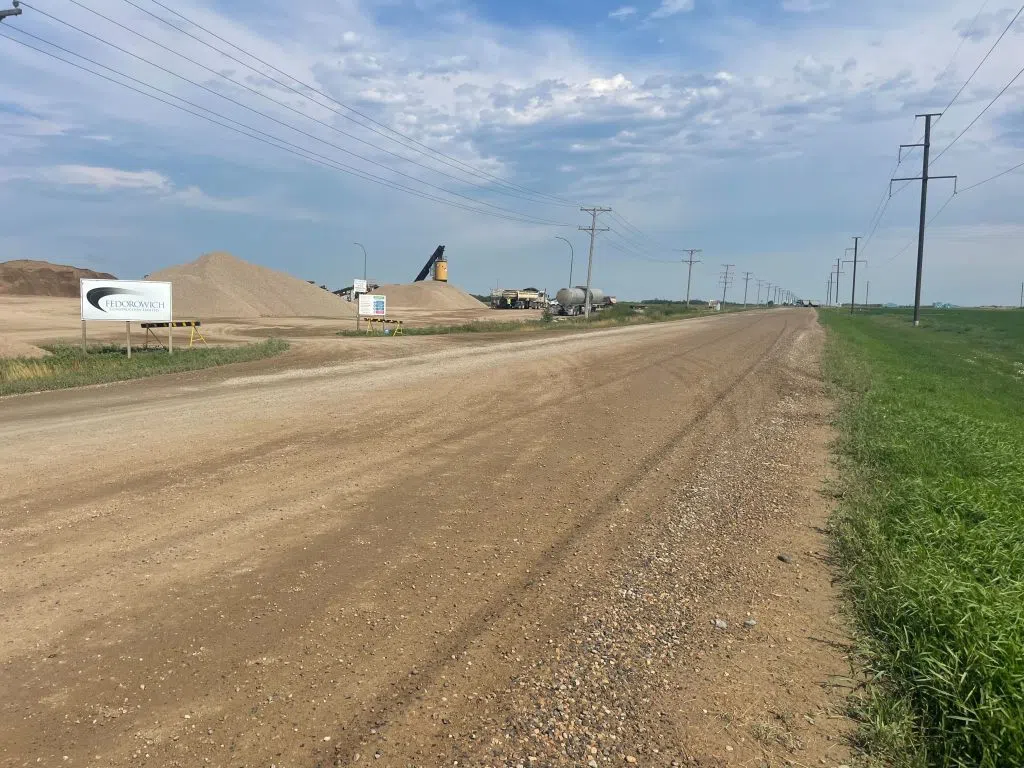Premier Scott Moe was in Yorkton on Wednesday to commit provincial support for improvements to Grain Millers Drive, located north of the city.
The province is committed to funding up to 50 per cent of the cost of improvements to the roadway, which provides access to Grain Millers Oat Mill and Richardson Oilseed, the largest canola crush facility in North America.
“Grain Millers Drive is a critical access point for several major agri-businesses and industries,” Moe said. “This is a key artery for the movement of goods and services, connecting local producers to national and international markets.”
Read more:
- Saskatchewan farmer calls for open markets face of Chinese canola tariffs
- Chinese tariff on canola seed comes into force as farmers hope for resolution
- Sask. premier calls for ‘immediate action’ from Ottawa to address massive Chinese canola tariffs
Before upgrades can be made, the Ministry of Highways, City of Yorkton and Rural Municipality of Orkney have agreed to launch a functional planning study.
The study will help determine what improvements are needed to ensure the road can support current traffic and future industrial growth.
“It gives us so many opportunities into the future for this region and for our city,” said Yorkton’s mayor, Aaron Kienle.
“(This will also) divert some traffic away from one of our community roads and urban highway connector, York Road… I think this is also a major step in safety for the city of Yorkton.”

Yorkton’s mayor spoke to the media alongside Premier Scott Moe at the Grain Millers Drive announcement. (Gillian Massie/980 CJME)
When asked how the funding will be split, Kienle said it depends on the scope of the project.
“Once we get the study back and we start looking at real numbers, the RM, the city and the province will sit down to kind of discuss all kinds of things,” he said.
Right now, the road provides access to Grain Millers Oat Mill and Richardson Oilseed. Louis Dreyfus Company operates a canola crush facility nearby and has plans to add a new pea protein production facility.
The seven-kilometre primary weight road connects with two provincial highways. Both ends of the road are paved, and there is a gravel portion of approximately 4.5 km in the middle. The study will identify options for paving Grain Millers Drive and for improvements to the road’s intersections with Highway 9 and Highway 16.

The current unpaved road leading to Grain Millers Oat Mill and Richardson Oilseed. (Gillian Massie/980 CJME)
Moe to visit China
Moe said he has already had “open discussions” with the federal government about visiting China together.
“We would be there in support of the federal government, negotiating an end to the canola tariffs that we have,” he said.
Moe mentioned that now is a good time to foster and advance relationships with China through its trade office in the country, which the province has had for over a decade.
“Saskatchewan is the obvious advocate and the obvious province to support the federal government in starting these discussions on how we can have a more free and open access to the Chinese market for the canola products,” he said.
Benefit to all canola farmers
When asked how improvements to a seven-km stretch of highway would help all canola farmers, Moe said that access to canola crush plants is key, as they provide access to producers around the world.
“This announcement today is us supporting local municipalities and supporting the canola industry more broadly in enhancing that access to the world and enhancing that opportunity for our municipalities to continue to grow,” he said.
Moe said the province is working on determining the next steps to ensure Saskatchewan’s canola and ag industries are secure in a very uncertain trade world.
“We have a president of the United States that is, making every effort to reset their trade relations with over 100 countries, all at the same time,” he said. “Every decision that the President makes, and our reaction, has a direct and indirect consequence.”
— with files from 980 CJME’s Gillian Massie











